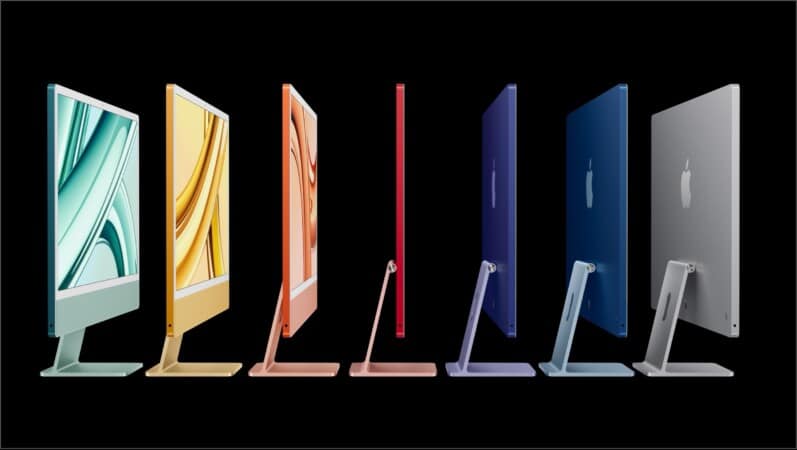As expected, Apple’s Scary Fast event was all about Macs. We got to see a new MacBook Pro 14 and 16-inch, along with a 24-inch iMac, all powered by Apple’s latest M3 series of chips. Still, many of us had eyes on the new iMac that was refreshed after three years. But should you really upgrade? Let’s find out in this comparison of the 2023 M3 iMac vs the 2021 M1 iMac.

M3 vs M1 iMac: Design
Starting from its exterior, the new M3 iMac 24-inch is unchanged from the M1 iMac, released in 2021. While it was expected that we might get to see a new iMac with a larger display, the new M3 iMac still features a 24-inch 4.5K display in an ultra-thin housing available in seven colorways.

Along with this, you still get the same 1080p FaceTime camera, along with a six-speaker sound system that supports Spatial Audio and studio-quality mics, which, to be honest, have been pretty great and don’t need upgrades.
M3 vs M1 iMac – Chipset
The chipset is the singular aspect where Apple’s newly refreshed 24-inch iMac has received a significant spec bump over the 2021 M1 model.
Apple’s new M3 chip is built on TSMC’s 3nm architecture and features 25 billion transistors. It has a new 8-core CPU, with four performance and four efficiency cores, that deliver up to 35 percent faster performance than M1.

Besides a faster CPU, the M3 also features a new 10-core GPU that is based on a newer architecture that enables Dynamic Caching, which allows the Mac to allocate more memory to the GPU depending on the tasks being performed.
This, along with support for hardware-accelerated ray tracing, makes the M3 almost 65 percent faster than M1 in graphic-intensive tasks.
M3 vs M1 iMac – Pricing
Given that the new M3 iMac is mostly similar to the M1 iMac, Apple has still kept the pricing of the base model at $1299 and the maxed-out model at $1699. Furthermore, Apple has now discontinued the M1 iMac. So, if you’re planning to get one now, you’ll have to get it from a third-party retailer.
Become an iGeeksBlog Premium member and access our content ad-free with additional perks.
If you want a more detailed breakdown of the pricing for the 24-inch M3 iMac, you may refer to the detailed table given below or visit apple.com.
| 24-inch M1 iMac Specs | 24-inch M3 iMac Specs | Pricing |
| 8-Core CPU + 7-Core GPU 8GB Unified Memory 256GB SSD storage 2x Thunderbolt / USB 4 ports Magic Keyboard | 8-Core CPU + 8-Core GPU 8GB Unified Memory 256GB SSD storage 2x Thunderbolt / USB 4 ports Magic Keyboard | $1299 |
| 8-Core CPU + 8-Core GPU 8GB Unified Memory 256GB SSD storage 2x Thunderbolt / USB 4 ports 2x USB 3 ports Gigabit Ethernet Magic Keyboard with Touch ID | 8-Core CPU + 10-Core GPU 8GB Unified Memory 256GB storage¹ 2x Thunderbolt / USB 4 ports 2x USB 3 ports Gigabit Ethernet Magic Keyboard with Touch ID | $1499 |
| 8-Core CPU + 8-Core GPU 8GB Unified Memory 512GB SSD storage 2x Thunderbolt / USB 4 ports 2x USB 3 ports Gigabit Ethernet Magic Keyboard with Touch ID | 8-Core CPU + 10-Core GPU 8GB Unified Memory 512GB SSD storage 2x Thunderbolt / USB 4 ports 2x USB 3 ports Gigabit Ethernet Magic Keyboard with Touch ID | $1699 |
Should you upgrade to the 24-inch M3 iMac?
Now for the final question – Should you really upgrade the 24-inch M3 iMac? No. In my opinion, you should refrain from upgrading to the M3 iMac as you don’t get anything more than a new chip in a boring old design with those pesky white bezels around a 24-inch 4.5K display and limited rear I/O ports.
Don’t get me wrong, Apple’s new M3 chip is more than capable in terms of performance. But just like M1, you can’t expect it to perform tasks geared towards Apple’s high-end Pro and Max series of chips. Even if you upgrade, you’ll still only be able to do what you did with the M1 iMac but a little faster.
In short, if you already own a 24-inch M1 iMac, there’s no point in upgrading to the new M3 model. However, if you’re looking to get your first Mac in an All-in-one format, the 24-inch M3 iMac should be your first preference.
Also read:
